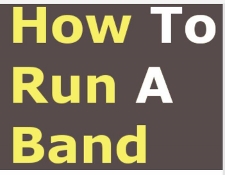
Seth Jackson
I’ve been interviewing full-time musicians for a while now on my Work Hard, Rock Harder podcast. After doing quite a few of these interviews, I’ve started to notice the difference between musicians that “wanna-be” and musicians that are “full-time.” Here’s six points highlighting those differences.
Can you spot yourself with any of these points?
1. No Excuses
A full-time musician will not make excuses about why she cannot be a full-time musician. Instead, she focuses on how to make things work, despite the obstacles.
A wanna-be is going to complain how they can’t make money because Spotify is killing the industry or bands can’t get signed any more.
A wanna-be will complain they can’t get enough time off work. There’ s not enough time in the day, not enough money.
A full-time musician will quit their day job to make things work. The day job, no matter how financially rewarding, will never be better than playing music for a living, no matter how financially meager.
A full time musician will figure out a way to make things work.
Not enough time in the day? Wake up earlier and get it done.
Can’t get time off work? Quit the job.
Children? Work with the family to help out.
A full-time musician doesn’t make excuses because she can’t afford to. Excuses only serve to block success…no matter how good the excuse is.
Only one thing works to become a full-time musician: Action.
2. Weed out the Weaklings
A full-time musician surrounds herself with musicians that are willing to do the work and make a band successful.
A wanna-be allows musicians to stay in the band that are only dragging the band down or preventing it from moving forward.
Do you have a guitarist who won’t take a week off work to do the tour?
Do you have a band mate that refuses to play last at the show because they have to work in the morning?
Will your band mates work their asses off to promote the shows, rehearse and bring in new opportunities?
Is that one band mate in so many bands he can’t dedicate enough time to do all the shows and rehearsals necessary?
Be honest. A full-time musician doesn’t coddle band members that aren’t pulling their weight. She can’t afford to because that will prevent her from doing music full-time.
A full-time musician realizes it’s better to have a musician that will do the work over the super-shredding musician. She will also risk ending a friendship rather than keeping the band held back.
 3. Don’t Bet It All on the Band
3. Don’t Bet It All on the Band
A full-time musician will do whatever is necessary to be successful…despite her band members.
Many times, the band you are in will break up. Sometimes, things just don’t work out for the band.
Other times, the band has an unexpected crisis that will put it on hold for months.
And, more commonly, your band just isn’t what people want to hear. That’s painful to take in, but it happens often. Your music doesn’t have broad enough appeal to make a living at.
However, a full-time musician doesn’t let that stop her. She will figure out how to play solo shows. She will reach out to other musicians to make things happen. She will sit in on other gigs.
A wanna-be musician will crumble as soon as the band crumbles. A wanna-be has not tried to build up their own personal network to be successful regardless of the band.
A wanna-be might even give up music altogether once their one band doesn’t work out after a few years.
The truth is your one band might not make you the money. You need to be a full-time musician. It can break up at any time.
What have you done to further YOU as a full-time musician, and not your band?
4. Diversify Income
Fitting hand-in-hand with “Don’t bet it all on the band”, a full-time musician diversifies her income, so she can make money every day of the week.
A full-time musician will play a solo gig in the afternoon before hitting the band’s show at night.
A full-time musician has students they teach on a weekly basis.
A full-time musician writes jingles and sound-bed music for film, TV, and even YouTube placement.
A full-time musician doesn’t bet it all on a couple of half hour performances for the week. Instead, she educates herself and puts herself out there to make more income with her music and knowledge of music.
A wanna-be musician only has the one band as an income source. She doesn’t explore publishing rights or licensing.
A wanna-be musician thinks doing a cover gig is “demeaning.” She thinks just filling in on another gig is “beneath” her.
A wanna-be musician doesn’t want to spend the extra time and energy to get students to teach. Or she balks at the extra effort of learning to teach through Skype when on the road.
The reality is that your band most likely won’t make all the money you need to survive. If you want each band member to make $50,000 a year in a 4-piece band, you will need to make at least $200,000 a year as a band. And that doesn’t include expenses like gas, hotels, recording, and marketing.
Having multiple outlets of making money is the main way to survive: Give lessons. Write jingles. Fill in with other bands. Do cover gigs.
Hell, one full-time musician I interviewed, Jason Wells, plays nursing homes between gigs!
5. Learn Everything You Can
A full-time musician learns everything she can about the music industry and music marketing. She does not wait for someone else to do it for her.
Knowledge is a musicians main weapon. Music is great, but there are a sea of other musicians and bands competing for the same piece of pie. How does a musician stand out?
A full-time musician knows that releasing her album or single is only the beginning. A full-time musician also knows that months of preparation outside of recording is needed.
The music industry is difficult to navigate. Without knowledge, you can sign a bad deal or hire the wrong people.
Reading that one book could make the difference between making money and losing money.
A full-time musician craves being a full-time musician, and she will throw herself into the uncomfortable zone of learning something she doesn’t really want to learn.
A wanna-be musician will throw up their hands and say, “I’m no good at that. I’m a musician, not a business person.”
A wanna-be won’t spend the time necessary to learn the industry or new skills to make their music and career successful.
A wanna-be always thinks that their music will be so freakin’ good that a music industry type will just have to scoop them up and give them a deal.
A wanna-be thinks that learning about the industry is someone else’s job.
A full-time musician faces the pain of learning new skills. She knows that she doesn’t need to be an expert at everything, but she needs to know enough to make things work.
A little knowledge about an aspect of the industry will help you know who to hire…and to know who is full of it in this industry. (Hint: There are a lot of people that are full of it that want your money.)
Yes, learning the business side of music is a little boring. It’s uncomfortable and can be overwhelming. But every little piece you learn puts you ahead of the pack, gets you a little closer to being successful.
6. Don’t Expect Someone Else to Do It
Building on the above point of learning, a full-time musician knows no one else is going to do it for them.
A full-time musician isn’t waiting for a manager to come along to make them successful. She is working her ass off to make her band successful.
A full-time musician isn’t waiting to win some game show to “make it”. She is playing shows every night, perfecting her craft, and inventing new ways to get new fans and more money.
A full-time musician isn’t expecting some record label to magically take her from playing small clubs to selling out arenas.
A wanna-be musician thinks they just need to get in front of the right person. If they just get introduced, they will be “picked up” and put in the spotlight of success.
A wanna-be musician thinks that winning singing contests will make her a star. After she wins, she doesn’t need to worry about it because a team will spring forth and handle everything.
A wanna-be thinks, despite not selling out any shows or selling any music, that they will get a deal to be on major tours.
The truth is record labels, managers and booking agents don’t want bands that aren’t already successful on their own. None of these people are into “artist development” as much as they are into making a percentage off of your sales.
If you aren’t selling out 400+ capacity clubs, a booking agent doesn’t want you. If you haven’t figured out how to get your music, merch, and publishing rights in order, a manager doesn’t want you. If you are not an “easy success,” a record label doesn’t want to spend thousands of dollars on you.
To be full time, you need to get yourself there before anyone will take notice of you. You need to already be successful to the point where you don’t actually need a manager, but the workload has gotten too much for you to move further. A manager is necessary to generate more cash for your band.
And getting a manager or a booking agent or a record deal doesn’t mean the work stops for you. That usually means you need to do even more work!
Lady Gaga sometimes has 30 hour days. Bands on labels need to wake up at 5 am to do interviews on radio, despite having played until 2 am the night before.
In Conclusion
I know I painted an extreme picture, and I don’t want that to dissuade you. Despite the effort involved, the reward is even better: you live for yourself playing the music you love.
The main point I wanted to drive home is the mindset of a full-time musician. A full-timer does what it takes to make it. A wanna-be complains, blames others, and waits instead of taking action.
 I’d love to hear your thoughts! Either comment below or shoot me an email at seth@howtorunaband.com.
I’d love to hear your thoughts! Either comment below or shoot me an email at seth@howtorunaband.com.
If you’d like to hear interviews with full-time musicians and how they make it, listen to my weekly podcast Work Hard, Rock Harder. I interview full-time, independent musicians as well as music industry experts with the goal of helping musicians live their dreams.
Cheers,
– Seth Jackson
http://howtorunaband.com
@Howtorunaband
Facebook
Google+

Thanks for letting me guest post here, Cynthia! And sorry for the wait!
Worth the wait! Loved your post. You are a welcome to guest blog for Amused Now any time.